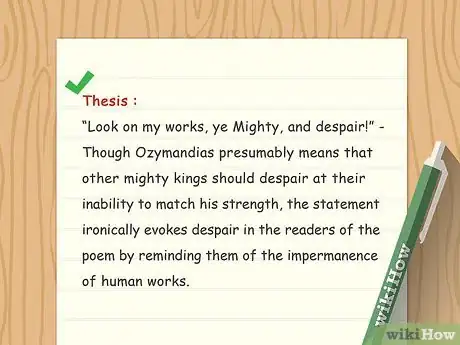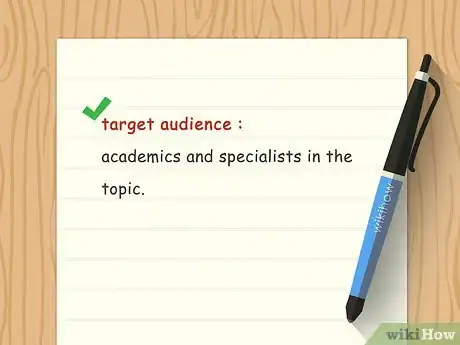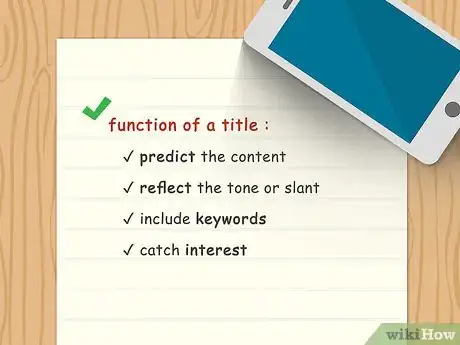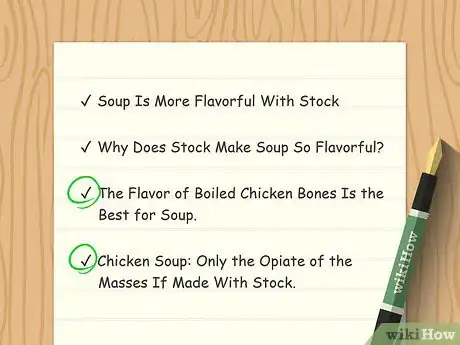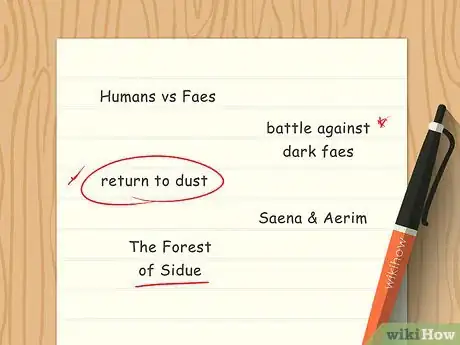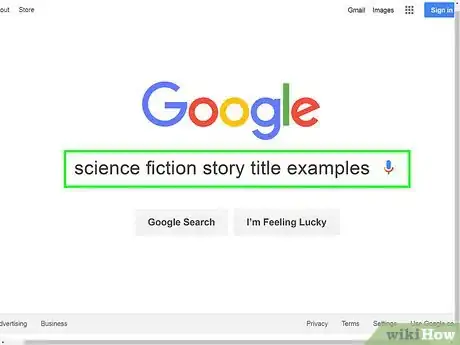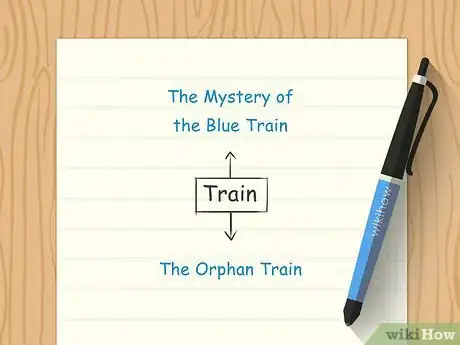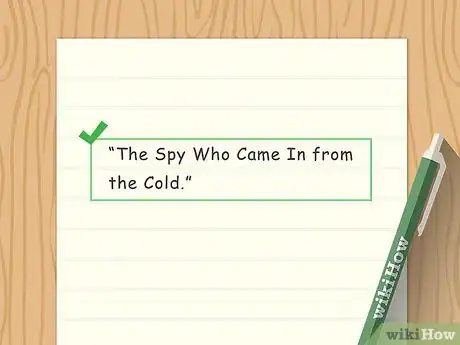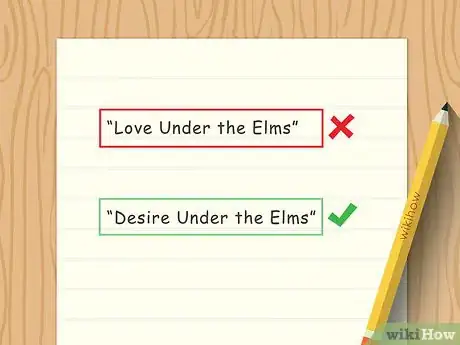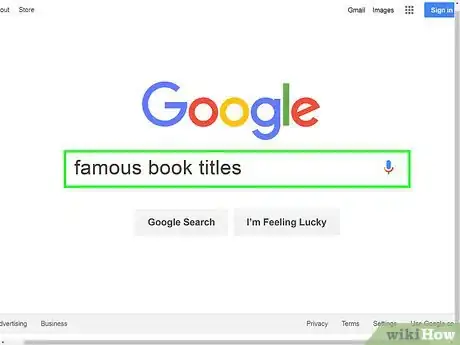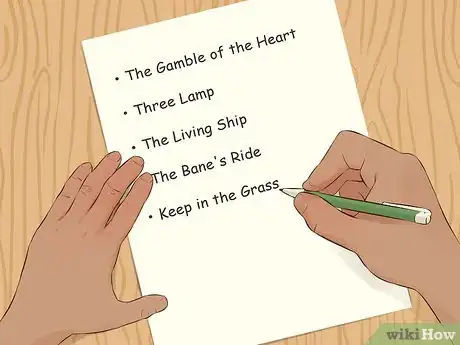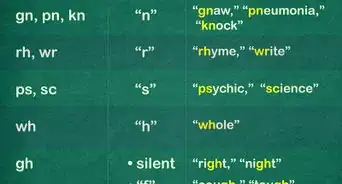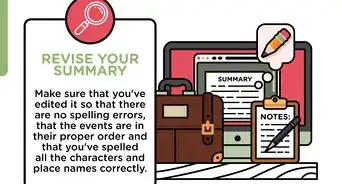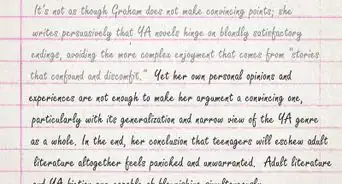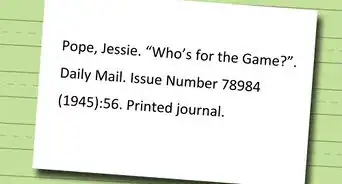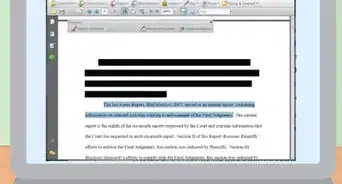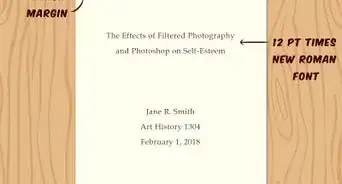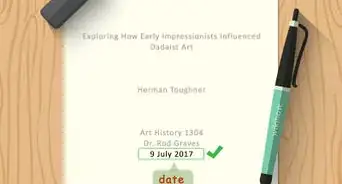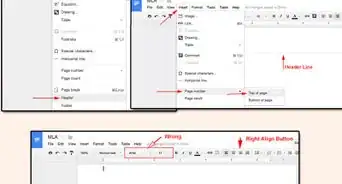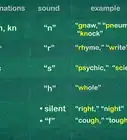This article was co-authored by Rachel Scoggins, PhD. Rachel Scoggins is a Visiting Assistant Professor of English at Lander University. Rachel's work has been presented at the South Atlantic Modern Language Association and the Georgia International Conference on Information Literacy. She received her PhD in Literary Studies from Georgia State University in 2016.
There are 10 references cited in this article, which can be found at the bottom of the page.
This article has been viewed 564,040 times.
Writing an essay or a story can seem like the hardest part of the project, but sometimes coming up with a catchy title can be just as challenging. However, with a combination of organization and creativity, you can create a wide selection of potential titles that will allow you to choose the perfect one for your work.
Things You Should Know
- For non-fiction titles, try combining 2 elements, like a quote and a main theme, with a colon between them.
- For fiction titles, jot down keywords about the main topic and characters. Arrange keywords in different combinations until you find something that you like.
- Use strong, vivid language to make your title stand out from the crowd.
Steps
Writing a Title for Non-Fiction
-
1Write a draft of your essay. A title is the first thing your reader will see, but it is often the last thing a writer creates. You may not know what your essay will really be saying until after you've written part of it.[1]
- Essays often change during the drafting and revising process. A title you come up with at the beginning may not reflect your essay when you have finished it. Make sure to also revise your title after you finish your paper.
-
2Identify major themes in your work. Typically, works of non-fiction have an argument. Create a list of two or three main points you're trying to make.[2]
- Look at your thesis statement. This sentence contains the major argument of your paper and can help you craft a title.
- Look at your topic sentences. Reading these sentences together can help you pick out themes, symbols, or motifs in your paper that can be integrated into the title.
- Consider asking a friend to read your work to help you identify themes.
Advertisement -
3Determine your target audience. Write down a few groups of people who would be interested in your topic, and why they would be drawn to it.[3]
- If you are writing a school assignment, or your audience are academics and specialists in your topic, use formal language. Avoid using a playful tone or slang terms.
- If you are trying to reach an online audience, think of what keywords a reader might use to find your article. For example, if you wrote a how-to article, include words like "beginner" or "do it yourself" that would identify your writing as appropriate for all levels of ability.
- If your piece is a news story, consider who you are writing about. For example, if are writing about an athletic team write down terms like "fan," "coach," "referee," or the team name. Readers with an interest in sports or that team can quickly identify your perspective and the topic of your story.
-
4Think about the function of a title. Titles predict the content in the essay, reflect the tone or slant, include keywords, and catch interest. Your title should never mislead the reader. A title can also reflect the purpose of the article, such as historical context, theoretical approach, or argument.[4]
-
5Decide between a declarative, descriptive, or interrogative title. When you are choosing one of these titles, think about the kind of information you want to convey to your reader.[5]
- Declarative titles state the main findings or conclusions.
- Descriptive titles describe the subject of the article but do not reveal the main conclusions.
- Interrogative titles introduce the subject in the form of a question.[6]
-
6Avoid titles that are too long. For nonfiction, titles should convey the important information, keywords, and even methodologies. But a title that is too long can be cumbersome and get in the way. Try to keep it around 10 words or less.[7]
-
7Seek ideas from your own writing. Reread your work to find sentences or phrases in which you refer to your main ideas. Often the introductory or concluding paragraphs of your work will have a phrase that would work well as a title. Highlight or make a note of any words or phrases that explain your ideas.
- Look for attention-grabbing descriptions or phrases you're proud of. For example, in an essay on censorship choose a phrase like "forbidden music" that is descriptive but also intriguing.
-
8Review your sources. Search quotations from sources you've used to support your points for something that grabs a reader's attention.
- For example, in an essay on religious persecution, a quote like "God was silent" is arresting and thought-provoking. Readers may immediately agree or disagree and will want to read your explanation.
- If you use someone else's words, make sure to put them in quotation marks, even in the title.
-
9Create a list of possible titles. Using your lists of themes, possible audiences, phrases, and quotes created in the previous steps, brainstorm possible title words and phrases. Try combining two different elements, such as a quote and a theme. Often writers separate two elements with a colon. The parenthetical notes in the following examples indicate which elements the author chose.
- The Negative Impact of Replacement Referees on Football Fans (Theme and Audience)
- "A Crucible of Victory": Understanding the Western Front in World War One (Quote and Theme)
- The Queen of Diamonds: Marie-Antoinette and Revolutionary Propaganda (Phrase and Theme)
-
10Respect conventions. Different disciplines, such as the sciences, the humanities, or the arts, may have different rules about what a title should look like. If you are aware of a specific expectation, you should conform to those guidelines. There are some general rules to remember:[8]
- Most words in your title should begin with a capital letter.
- The first word and the first word after a colon should always be capitalized even if one of the "short words."
- In general, do not capitalize the following words: and, a, an, the, or short prepositions if they are not the first letter in the title.
- If the title of a book or film is part of your essay title, it should be put in italics, e.g., Gender Relationships Between Vampires in Twilight. Short story titles are always in quotation marks.
- Know if the paper follows MLA, APA, or another style. Websites like Purdue University's Online Writing Lab, APA Style, and MLA Handbook can help you with conventions for titles.
Writing a Title for Fiction
-
1Brainstorm ideas. Write down every word that comes to mind about your story. Include keywords about the topic, character names, phrases you love, and anything else that comes to mind. Arrange these in different combinations to see if anything speaks to you.[9]
-
2Study titles in your genre. Look for stories or books that are popular with your target audience. Readers may be drawn to your work because it reminds them of something they already like.
- For example, many young adult fantasy novels hinge on one or two intriguing words: Twilight, Bitten, Cinder, The Selection.
-
3Make the title exciting. Dull or generic titles won't catch the reader's eye. Titles such as "The Tree" or "The Train" might name the subject or a symbol in the story, but it doesn't excite the reader.
- Try adding a more descriptive word to the basic title. Successful titles using the above words include The Giving Tree, A Tree Grows In Brooklyn, The Mystery of the Blue Train, and The Orphan Train.
-
4Make the title easy to remember. Titles are not only supposed to catch the reader's attention, but also spread the word about your work. Something too difficult to remember won't appeal to editors or agents, and your reader won't remember and be able to tell someone else the title. You want to come up with an exciting, yet catchy and easy to remember, title.
- Read your title out loud. Does it roll off the tongue? Is it exciting? Does it sound boring? Would you check out this title? The answers to these questions can help you revise the title.
-
5Pay attention to the wording. A title should be appropriate for the story, but it doesn't need to confuse your potential readers. Make sure that your wording doesn't depict the story as something it is not. Your title shouldn't sound like a science fiction story if it's a romance.
-
6Use strong, vivid language. A title needs to stand out. Strong action words, vivid adjectives, or intriguing nouns can all make your title compelling. Look at the words in your potential title. Are there synonyms that are more descriptive or unique? Can you choose a word that has a less general meaning? Some words are so common their meaning doesn't impact readers the same way.
- For example, the use of the word desire in Eugene O'Neill's Desire Under the Elms is far more interesting than Love Under the Elms.[10]
-
7Seek inspiration. Book titles often derive from established great works, such as the Bible, Shakespeare, song lyrics, or other sources. Write down phrases that are meaningful, beautiful, or intriguing to you.
- Examples of this type of title include: The Grapes of Wrath; Absalom, Absalom; Gaudy Night and, The Fault in Our Stars.
-
8Read your own work. Titles are often memorable lines from the book or story itself. Readers may enjoy the moment when they realize why a story has a particular title.
- Examples of this type of title include To Kill a Mockingbird, Catch-22, and Catcher in the Rye.
-
9Write down your inspirations when they come. Often, good writing ideas come to you when you least expect it. You may forget these, so keep a paper and pencil handy to jot down ideas that come to you whenever inspiration may strike.
Community Q&A
-
QuestionHow can I make my story be exciting or inspirational? How can I make people love it?The only thing under your control is the story; you can't twist people's arms until they scream that it's good. So the only way to make people love it is to write good stories. Practice, then practice some more. Most of what you write you will delete, but some of it will remain standing, and if you put all those bits together, that's when people will love it.
-
QuestionWhere do I go if I need more people to read my book for tips and criticism?
 Mallory MyersCommunity AnswerThe best place to get good criticism is to show parts of the story to people you know who are in your preferred audience. Reach out to your friends' friends, teachers (if you know any), and family members.
Mallory MyersCommunity AnswerThe best place to get good criticism is to show parts of the story to people you know who are in your preferred audience. Reach out to your friends' friends, teachers (if you know any), and family members. -
QuestionI have a book that has a one-word title, but has the series name on top of it. Will that be intriguing enough for readers?
 Community AnswerIt depends how strong the series name is, but don’t count on it to save you. It’s the book name that really counts. Personally, I’d go for two-six words. If it’s something like Cursed, which is a strong name, it’s fine.
Community AnswerIt depends how strong the series name is, but don’t count on it to save you. It’s the book name that really counts. Personally, I’d go for two-six words. If it’s something like Cursed, which is a strong name, it’s fine.
References
- ↑ https://www.trentu.ca/academicskills/how-guides/how-write-university/how-approach-any-assignment/writing-english-essay/drafting-english
- ↑ https://www.grammarly.com/blog/themes/
- ↑ https://owl.purdue.edu/owl/general_writing/common_writing_assignments/research_papers/identifying_audiences.html
- ↑ http://writing.umn.edu/sws/assets/pdf/quicktips/titles.pdf
- ↑ https://www.ncbi.nlm.nih.gov/pmc/articles/PMC6398294/
- ↑ http://blog.efpsa.org/2012/09/01/how-to-write-a-good-title-for-journal-articles/
- ↑ https://library.sacredheart.edu/c.php?g=29803&p=185911
- ↑ https://libguides.usc.edu/writingguide/title
- ↑ https://writingcenter.unc.edu/tips-and-tools/brainstorming/
About This Article
To help you come up with a title for an essay, write a draft of your paper first so you know what its main themes are. Then, write down key points in your essay that you could include in the title. Before making a decision, take your audience into account, such as by trying to include keywords in a title if your article is for an online audience. Additionally, decide whether you want to state the conclusion of your piece up front with a declarative title or introduce the subject as a question with an interrogative title. For tips on how to come up with a title for a story or other work of fiction, read on!

